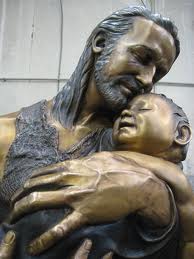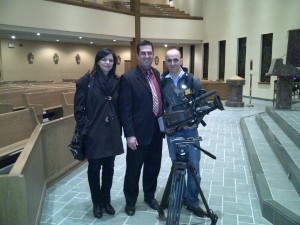 Now that we’ve looked briefly at the case for Saint Joseph as an older man in our last post, how about the other side of the argument? Is it possible that Saint Joseph was a younger man when he became the adoptive father of Jesus? Under this view, it would still be possible to hold the opinion that Joseph knew about Mary’s prior commitment to consecrated virginity, or (far more unlikely) that they were planning a “normal” marriage prior to Mary’s discovery of her unique vocation to be the Mother of the Messiah?
Now that we’ve looked briefly at the case for Saint Joseph as an older man in our last post, how about the other side of the argument? Is it possible that Saint Joseph was a younger man when he became the adoptive father of Jesus? Under this view, it would still be possible to hold the opinion that Joseph knew about Mary’s prior commitment to consecrated virginity, or (far more unlikely) that they were planning a “normal” marriage prior to Mary’s discovery of her unique vocation to be the Mother of the Messiah?
Here’s what St. Josemaria Escriva, who had a tremendous devotion to St. Joseph, said about the matter in a homily about St. Joseph in 1963:
“I don’t agree with the traditional picture of St Joseph as an old man, even though it may have been prompted by a desire to emphasise the perpetual virginity of Mary. I see him as a strong young man, perhaps a few years older than our Lady, but in the prime of his life and work…You don’t have to wait to be old or lifeless to practice the virtue of chastity. Purity comes from love; and the strength and gaiety of youth are no obstacle for noble love. Joseph had a young heart and a young body when he married Mary, when he learned of the mystery of her divine motherhood, when he lived in her company, respecting the integrity God wished to give the world as one more sign that he had come to share the life of his creatures. Anyone who cannot understand a love like that knows very little of true love and is a complete stranger to the christian meaning of chastity.”
I suppose an important question in this debate is this: How old is old? perhaps a type of “hybrid” view makes the best sense. For example, Joseph could have married Mary when he was about 25-30 years old (with Mary being, in all likelihood, no more than 16, according to the majority of New Testament scholars). Joseph would have still possessed a relatively “young body”, as St. Josemaria put it, able to withstand the rigors of the flight into Egypt and the journey back to Nazareth some time later. He would have been capable of working hard for many years and protecting Jesus and Mary, as well as providing for their necessities.
The average life span of men in the first century in the Roman Empire was considerably less, however, than what we enjoy today. Thirty years later, when Jesus began his ministry, it is more than concievable that Joseph, approaching sixty, may have already passed away.
 In case you didn’t catch my interview on CBC’s The National on Easter Sunday, the segment on religion and technology has now been posted online here:
In case you didn’t catch my interview on CBC’s The National on Easter Sunday, the segment on religion and technology has now been posted online here:



